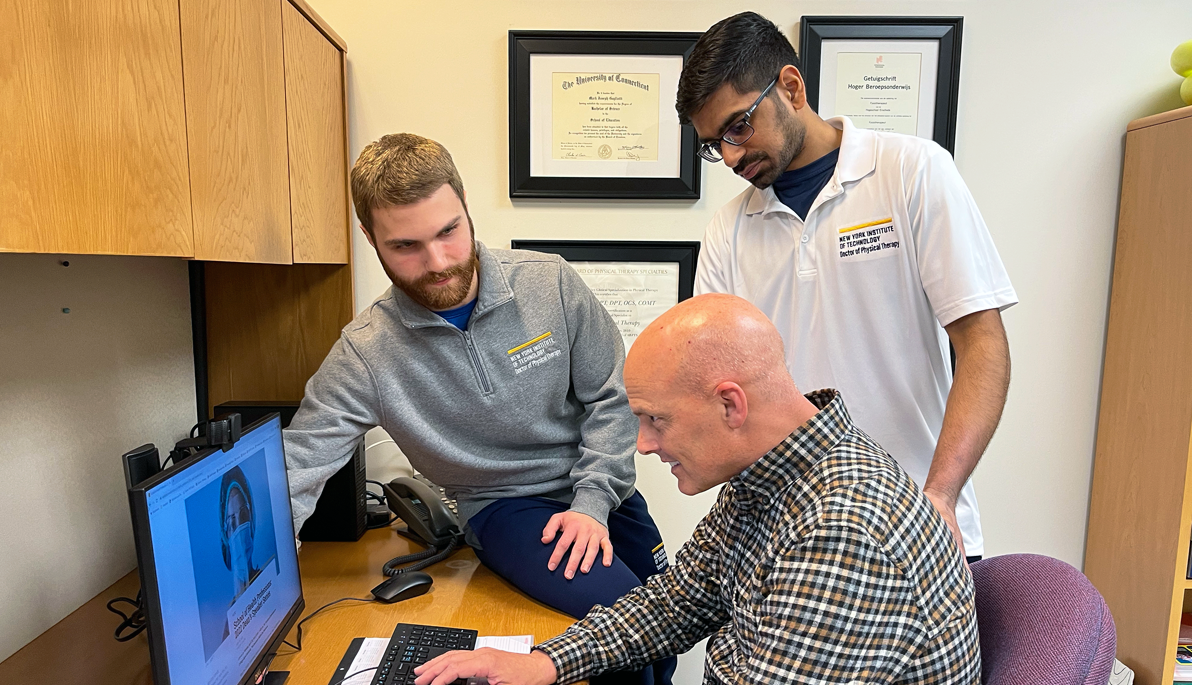
Improving Health, One Posture Check at a Time
January 25, 2023
Pictured: Physical therapy students Francesco Alfano and Nevin Johnson offer Associate Professor Mark Gugliotti tips to improve his posture while seated at his desk.
If you’re reading this while using a desktop computer, perform a quick posture check. Are your feet flat on the floor with your arms resting parallel to the ground? Are your ears, shoulders, torso, and hips aligned with each other? Are your eyes level with the top of your computer screen? If the Physical Therapy Posture Patrol pays you a visit, these are some things they will evaluate and help to correct.
Eight years ago, Associate Professor of Physical Therapy Mark Gugliotti, D.P.T., was brainstorming ideas for community service that physical therapy (PT) students could perform on New York Tech’s Long Island campus. Knowing neck and lower back pain are some of the most common concerns from patients seeking PT, and that those pains are nearly always related to a person’s work environment, Gugliotti formed the Posture Patrol. This service initiative, which acts as a bridge between intervention and education for the New York Tech community, is designed as an educational training opportunity for first and second-year PT students to “initiate contact with somebody who either purposely came to them or just happened upon them as a result of this initiative,” Gugliotti explains.
For New York Tech doctor of physical therapy (D.P.T.) students Francesco Alfano, who is working toward his degree after coming to New York Tech through the Adelphi University/New York Institute of Technology Bachelor of Science (B.S.)/D.P.T. Early Decision Program, and Nevin Johnson, who enrolled in New York Tech’s six-year dual Life Sciences, B.S./Physical Therapy, D.P.T. degree program, the Posture Patrol is an outlet to practice PT (both were drawn to the field based on personal experiences with family members who have required intense physical therapy) and a way to reinforce skills in speaking with new clients.
“To have the experience of talking to new people and to learn and hone that public speaking skill—I think that’s what Posture Patrol does very well,” Alfano says. “It encourages you to approach a random group of people who you may have never met before and do your best to give them input on why their posture is important. Posture Patrol is valuable for us as students because a huge part of our job is to educate our patients about why something like posture is important.”
As PT students participating in Posture Patrol come across faculty, staff, or other students sitting at a workstation or otherwise looking like they may need a posture adjustment, the students offer information and hand out a card with cues and reminders for keeping their body in the correct posture position. The card even includes a visual diagram of what the body should look like while seated at a desk. Johnson describes how when he pays a visit to faculty and staff, they are always pleasantly surprised to see how their postural issues can be addressed after just a few quick adjustments to their workstation setup.
“A lot of people are unaware of their posture, and they’re very interested in seeing what they can do on a daily basis to improve upon certain aspects of their posture,” Johnson says. “It’s really great to have this opportunity to educate other people on these things.”
Gugliotti notes there are simple things to be done to ensure proper posture throughout the day. One idea is setting a timer at your workstation—whether for 15, 30, or 45 minutes—and every time the alarm goes off, put your body into motion. This method of keeping a timer forces a person to break out of their prolonged sitting position. He often observes individuals “glued” to whatever project they are currently working on, which can be unstainable for a healthy body.
“It’s important to take a break and stay hydrated,” Gugliotti suggests. “Maybe stretch, like an easy standing yoga pose. Whatever the choice is, break the habit of staying in the same position, and you’ll find that you can sustain your actions longer and in a more comfortable way.”
Gugliotti says bad posture can easily catch up to you. He advises that proactivity and adopting healthy habits as soon as possible are best practice for warding off consequences of poor posture, which can include tension headaches, rounded shoulders, neck aches, back pain, and even nerve tissue compression.
As Alfano and Johnson continue their PT outreach work with Posture Patrol alongside their studies, they are already looking ahead to the National Physical Therapy Examination (NPTE) upon their 2024 graduation—and hope to follow in the footsteps of the D.P.T. class of 2022, which achieved a 100 percent pass rate on their licensure exams.
Watch a demonstration.
@newyorktech Sit up straight! New York Tech’s physical therapy students in the Posture Patrol are coming for you. #NewYorkTech #PT #physicaltherapist #physicaltherapytiktok ♬ original sound - NewYorkTech
More Features

An Alumnus’ Commitment to the Environment
As an energy management graduate from New York Tech’s Vancouver campus, Jasdeep Gulati (M.S. ’22) is highly invested in educating people about environmental and climate sustainability.

Vancouver Faculty Win University-Sponsored Research Awards in New Program
The new Global Impact Research Grant (GIRG) program has been developed to keep Vancouver-based faculty connected to faculty and research projects being conducted on the university’s New York campuses.

Studying Climate Change One Degree at a Time
Junhua Qu (M.S. ’24) began her collegiate journey in Beijing. But, her interest in climate change took her to New York Tech’s Vancouver campus to study energy management.
